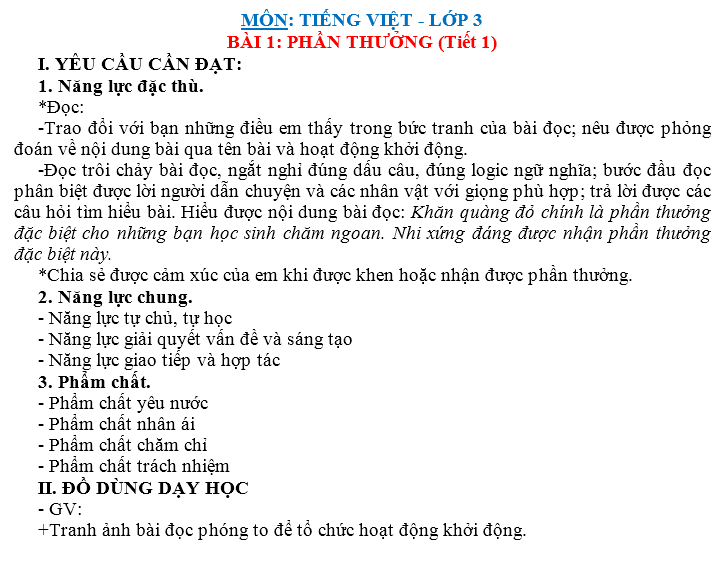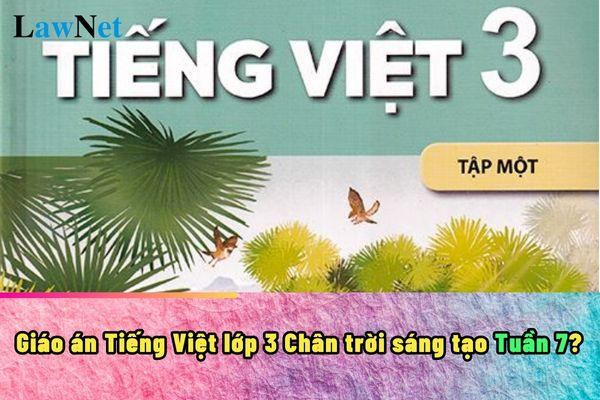Lesson Plan for week 7 of grade 3 Vietnamese Language subject according to Chân trời sáng tạo curriculum
Lesson Plan for week 7 of grade 3 Vietnamese Language subject according to Chân trời sáng tạo curriculum
For teachers, preparing a lesson plan helps them to establish a detailed plan and assissts them in having a clear and specific teaching plan for each lesson.
As a result, teachers can reasonably arrange lesson contents ensuring the most efficient transmission of knowledge to students.
Therefore, in this article, teachers can refer to the following lesson plan for week 7 of grade 3 Vietnamese Language subject according to Chân trời sáng tạo:

Download Lesson Plan for week 7 of grade 3 Vietnamese Language subject according to Chân trời sáng tạo curriculum

Lesson Plan for week 7 of grade 3 Vietnamese Language subject according to Chân trời sáng tạo curriculum (Image from the Internet)
What are requirements for grade 3 Vietnamese Language subject according to Chân trời sáng tạo curriculum?
Based on Section V of the Literature Education Program issued with Circular 32/2018/TT-BGDDT, the requirements for Grade 3 Vietnamese Language subject in general or for the Chân trời sáng tạo curriculum must be based on the specific framework of the Literature Education Program as follows:
*Key qualities and general competencies requirements
The Literature subject contributes to forming and developing key qualities and general competencies in students at levels suitable for the subject, school grade as regulated in the overall program.
Besides, based on Section IV of the Literature Education Program issued with Circular 32/2018/TT-BGDDT, the specific competencies needed after completing the grade 3 Vietnamese Language program include:
[1] Necessary language competence:
- Read correctly, fluently, and expressively; understand the main content of texts, primarily explicit content; initially understand implicit content like themes, lessons from the read texts.
- At primary levels, reading requirements include both reading skills and reading comprehension skills. For students in early grades (Grade 1, Grade 2), focus is on reading correctly at an appropriate speed and understanding simple text content.
For students in Grades 3, 4, and 5, more emphasis is on understanding specific content, themes, and lessons from texts.
- From Grades 1 to 3, write correctly in spelling, vocabulary, and grammar; write sentences and short paragraphs; in Grades 4 and 5, initially write complete short essays, mainly narratives, descriptions, and simple introductions.
- Write texts recounting stories read, events witnessed or joined, imagined stories; describe familiar objects or phenomena; introduce objects and activities close to students' lives.
- Write paragraphs expressing students' feelings and thoughts when reading a story, poem, witnessing an event that inspires emotions; state opinions on a simple issue in study and life; write various text types like self-introduction, messages, invitations, schedules, applications,...; initially knowing how to write in process; ensure the text has three parts (introduction, body, conclusion).
- Present ideas and emotions understandably; initially use appropriate gestures and expressions when speaking; clearly recount read or heard stories; share, exchange their feelings, attitudes, thoughts on discussed issues; explain an object or simple process.
- Listen and understand with appropriate attitude and grasp the main content; recognize speakers' emotions; know how to respond to what is heard.
[2] Necessary literary competence:
- Distinguish between narrative and poetry texts (paragraphs, prose texts, and paragraphs, verse texts); recognize text content and writer's attitudes, feelings; initially grasp the effects of some literary text forms (language, characters, plot, rhyme, comparison, personification). Know to imagine and express literarily in writing and speaking.
- For Grades 1 and 2 students: recognize who or what the text is about; recognize characters in stories, rhymes in poems; distinguish between stories and poems.
- For Grades 3, 4, and 5 students: know how to read texts expressively; retell and summarize stories, poems; evaluate characters, events, and writers' attitudes, feelings in texts; recognize time and place, some poetic elements, beautiful, unique language, images and effects of personification, comparison rhetoric.
- Understand the meaning or lesson from the text. Write paragraphs, essays narrating, describing emotions, and imaginative links.
Thus, according to the regulations, the requirements for grade 3 Vietnamese Language subject according to Chân trời sáng tạo curriculum must ensure common and core requirements.
How to evaluate grade 3 students in Vietnamese Language subject?
Based on Section VII of the Literature Education Program issued with Circular 32/2018/TT-BGDDT, the requirements for Grade 3 Vietnamese Language in general or the Creative Horizons series must be based on the specific framework of the Literature Education Program as follows:
- Evaluation in Literature is done in two ways: continuous evaluation and periodic evaluation.
- Continuous evaluation is conducted throughout the teaching process, organized by the subject teacher; the evaluation forms include: teacher evaluates students, students evaluate each other, and self-evaluation by students.
To evaluate continuously, teachers can rely on daily observations and notes about students, their responses to questions or presentations, test results, literary analysis and feedback writing, project report writing, research exercises,...
- Periodic evaluations are conducted near the end or at the end of a learning phase (end of semester, end of school year) organized by educational institutions to manage teaching activities, ensure education quality, and serve the development of programs, and learning materials. Periodic evaluations are usually conducted through test or exam papers.
Test, exam papers can require written essays (single or multiple questions); combine multiple-choice questions and essays (open questions) to evaluate reading comprehension and writing essays on learned topics. Oral tests may be used (to evaluate speaking and listening) if necessary and feasible.
- In evaluating end-year or end-course results, methods need to be innovated (structure of questions, expressing questions, difficulty level...); use and utilize evaluation materials that ensure evaluating students' competencies, overcoming learning by heart or copying available materials; avoid reusing learned texts to accurately assess reading comprehension and literary analysis.
- Regardless of the evaluation method, it must ensure that students can express their qualities, language competence, literary competence, figurative thinking, logical thinking, their own thoughts and feelings without borrowing or copying; encourage essays with personality and creativity.
Students need guidance to thoroughly understand the objectives, methods, and evaluation criteria system used to assess these qualities and competencies.
Download the Literature Education Program issued with Circular 32/2018/TT-BGDDT.

